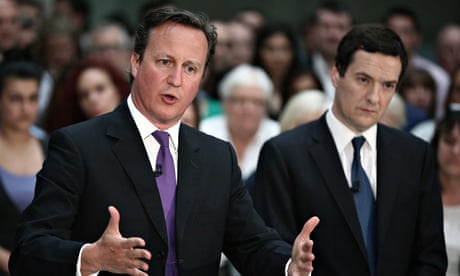The Conservatives are charging business executives and lobbyists £2,500 each for access to David Cameron, George Osborne and other ministers at their party conference in Birmingham this year.
The paying guests will attend the conference's "business day", which will include lunch with the prime minister and dinner with the chancellor. They will also have a chance to talk to ministers about their specific concerns in "policy break-out" sessions.
Some of the senior frontbenchers on offer include a foreign office minister hosting a session on exports, defence ministers discussing procurement and treasury ministers talking about tax. Jo Johnson, the head of the Downing Street policy unit, will speak about Conservative business policy.
Companies sending representatives are able to avoid disclosing if they have bought a table because parties are allowed to class the cash as fees received as part of a commercial transaction, rather than a political donation. Political donations of more than £7,500 have to be reported to the Electoral Commission.
A Conservative brochure advertising the event reveals Cameron, Osborne, Nicky Morgan, David Gauke, Andrea Leadsom, Elizabeth Truss, Esther McVey, Michael Fallon, Eric Pickles, Greg Clark, Nick Boles, Kris Hopkins, Matthew Hancock, Hugo Swire, Amber Rudd, David Lidington and Ed Vaizey among the ministers taking part in the business day.
The price of spending time with ministers appears to have more than doubled in recent years. Tickets for the inaugural Conservative business dinner in 2010 cost £1,000 each, and attendees at the 2012 event – including payday loans firm Wonga – paid £1,250 a ticket.
Cameron regularly holds dinners and other social events with donors as part of his "leader's club" at a price of £50,000 a year. Those who take part in the club are named on the party's website.
The Conservatives had no comment about the rise in price or the classification of the cash as a donation.
The Tories are not the only party to sell access to their frontbench. Labour is also marketing a "business forum package" for its conference in Manchester that includes breakfast, lunch and a guaranteed place at its business reception for just under £1,300 a head. It also classifies the cash as a commercial transaction.
The Liberal Democrats are selling tickets for their business day at £800 each and for their business dinner at £350. The party's conference website describes the event as "an excellent occasion for business leaders and public affairs executives to meet senior Liberal Democrats and discuss the current issues, challenges and opportunities facing British businesses today".
Alexandra Runswick, the director of campaign group Unlock Democracy, said the events were about "being able to buy access to politicians".
She said: "In any situation where business are paying large amounts of money to spend time with ministers, the names should be disclosed."
The Guardian and the Bureau of Investigative Journalism revealed earlier this year that guests at the Conservatives' 2013 summer ball had a combined wealth in excess of £11bn, with elite diners sitting at tables costing up to £12,000 each to rub shoulders with David Cameron, Theresa May, Philip Hammond and Boris Johnson.
Before Cameron took power in May 2010, he had promised a "new politics" that would restore public trust and reform party funding to "clean up our messy politics". Cross-party talks on the issue have collapsed.
All the parties are now in a race to raise money before the election, with their autumn conferences providing a lucrative opportunity for them to sell advertising, exhibition space and sponsorship of everything from lanyards to hotel key cards.
